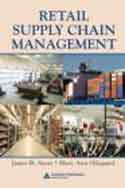
|
Retail Supply Chain Management - James B. Ayers |
Author |
James B. Ayers
Mary Ann Odegaard
|
|
Cover Price : Rs 595.00
|
Imprint : T & F / Routledge
ISBN : 0849390524
YOP : 2008
|
Binding : Paperback
Total Pages : 448
CD : No
|
|
FORTHCOMING TITLE |
About the Book :-
A consequence of business specialization is the implementation of weak processes that cross departmental and corporate boundaries. Supply chain management (SCM) addresses this issue by requiring a process view that reaches across these confines. Due to globalization and a competitive environment, those within the retail supply chains are particularly vulnerable. New ways of managing require an understanding of the entire chain by participants at every level-retailer, distributor, manufacturer, and service provider.
Demonstrating the link between markets, products, and product strategies in the supply chain, Retail Supply Chain Management provides the knowledge and skills required to thrive in this environment. It demonstrates the connection between the processes involved in manufacturing, distribution, warehousing, and transportation, and how to use these connections to their best advantage.
The book offers fresh insights into the financial and operational tools that are available and how to use these tools in order to deliver quality products in the most cost efficient manner. The authors' collaboration brings together expertise from both operations and retail business management, matching the solutions available from SCM with the challenges and opportunities that arise in the retail industry. The text also includes case studies and experiences from leaders in SCM as well as hard lessons learned by those trying to lead. These examples illustrate specific solutions to common situations in a retail supply chain.
Contents :-
Preface. Retail Supply Chain Management. Types of Supply Chains in Retail. Retail Strategy & Supply Chains. Supply Chain Performance Management. Delivering Supply Chain Service. Achieving Financial Success in the Retail Supply Chain. Index. |
|
 |
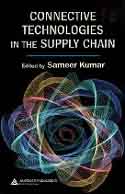
|
Connective Technologies in the Supply Chain - Sameer Kumar |
|
|
Cover Price : Rs 595.00
|
Imprint : T & F / Routledge
ISBN : 1420043495
YOP : 2008
|
Binding : Paperback
Total Pages : 296
CD : No
|
|
FORTHCOMING TITLE |
About the Book :-
Rapid time-to-market expectations and the demand for custom-tailored products present real challenges for the rigid and fixed linear supply chains that compete in today's economy. Connective technologies meet these challenges head on by integrating the necessary people, information, and products beyond their current limitations.
Connective Technologies in the Supply Chain illustrates the impact that connective technologies have across supply chains. It provides strategic frameworks, conceptual and analytical models, and case studies that focus on the design, development, and implementation of these technologies as they pertain to the management of engineering and manufacturing operations.
Placing particular emphasis on RFID, the book addresses issues that include those involving GPS, inventory management, quality control, mobile technology, and security challenges. The book presents an overview of RFID applications, its underlying concepts and principles, and a macro perspective on its implementation in the manufacturing and service sectors. It also provides a feasible design of the technology's enabled knowledge-based supply chain management system.
Connective Technologies in the Supply Chain is an essential resource for those who would like to expand their knowledge of-and increase their success with-these applications.
Contents :-
Preface, RFID: A Strategic Overview. RFID in Supply Chain Management: A Review of Applications. RFID Technology Implementation in Manufacturing and Retail Sectors: A Macro Perspective. RFID: Impact of Improved Supply Chain Traceability. Knowledge Integration in Connective Technology Networks: Application in Supply Chain Risk Management. Design of an RFID-enabled Knowledge-based Logistics Management System. Role and Application of RFID in Libraries. A Holistic Look at RFID Innovations: The Patent Approach. RFID Technology in the Indian Retail Sector. Prevention and Management of Product Recalls in the Processed Food Industry: An Exporter's Perspective. RFID Technology Innovators: DEA Analysis. Index. |
|
 |
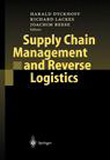
|
Supply Chain Management And Reverse Logistics - Harald Dyckhoff |
Author |
Harald Dyckhoff
Richard Lackes
Joachim Reese
|
|
Cover Price : Rs 695.00
|
Imprint : Springer
ISBN : 8181282035
YOP : 2008
|
Binding : Paperback
Total Pages : 426
CD : No
|
|
About the Book :-
The world of logistics has considerably changed due to globalization, modern information technology, and especially increasing ecological awareness. Large Supply Chain Management (SCM) systems are developing to global logistic networks. This book reflects major trends of the recent decade in SCM and, additionally, presents ideas and visions for logistic networks of the 21st century. Among the various aspects of SCM, emphasis is placed on reverse logistics: closing the loop of a supply chain by integrating waste materials into logistic management decisions.
Contents :-
From Supply Chain to Closed Loop Systems: H. Dyckhoff, R. Souren, J. Keilen: The Expansion of Supply Chains to Closed Loop Systems: A Conceptual Framework and the Automotive Industry's Point of View.- F. Schultmann, M. Zumkeller, O. Rentz: Integrating Spent Products' Material into Supply Chains: The Recycling of End-Of-Life Vehicles as an Example.- T. Spengler, W. Stölting, M. Ploog: Recovery Planning in Closed Loop Supply Chains: An Activity Analysis Based Approach.- K. Inderfurth: Product Recovery Behaviour in a Closed Loop Supply Chain.- M. Fleischmann, S. Minner: Inventory Management in Closed Loop Supply Chains.- K. Richter, I. Dobos: Production-Inventory Control in an EOQ-Type Reverse Logistics System.- Architecture and Coordination of Networks: M. Steven: Networks in Reverse Logistics.- A. Tuma, J. Friedl, S. Franke: Environmental-Oriented Coordination of Supply Networks.- G. Zäpfel, M. Wasner: Architectures of Transportation Networks and their Effects on Economic Efficiency.- C. Hofmann, H. Asseburg: Cash Flow- and Inventory-Oriented Coordination of the Supply Chain.- K. Takahashi, Myreshka: The Bullwhip Effect and its Suppression in Supply Chain Management.- Supply Chain Management and Advanced Planning: C. Schneeweiß, E. Kleindienst: Aggregation of Mixed Integer Production Models by Shadow Prices in Supply Chain Management.- B. Fleischmann, H. Meyr: Customer Orientation in Advanced Planning Systems.- G. Wäscher: Order Picking: A Survey of Planning Problems and Methods.- H. Tempelmeier, G. Reith-Ahlemeier: Advanced Purchasing and Order Optimization.- J. Reese: Optimal Maintenance in the Supply Chain.- S. Voß, A. Witt: Hybrid Flow Shop Scheduling with Batching Requirements.- R. Lackes: Information System for Supporting Supply Chain Management. |
|
 |
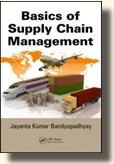
|
Basics of Supply Chain Management -Jayanta Kumar Bandyopadhyay |
Author |
Jayanta Kumar Bandyopadhyay
|
|
Cover Price : £ 59.99
|
Imprint : CRC Press
ISBN : 9781466588929
YOP : 2016
|
Binding : Hardbound
Total Pages : 366
CD : No
|
|
About the Book :-
Features
Covers all modules of a basic supply chain management course
Contains sections on issues of particular contemporary importance such as global alliances and outsourcing
Includes discussion questions after every chapter
Presents case studies of 20 different companies to illustrate different supply chain strategies and issues
Includes many self-study test questions to help you prepare for the certification exam
Summary
The practice of supply chain management has become widespread in most industries. It is now included in the curriculum of many business schools in the United States and in many countries around the world. A number of professional associations, such as the American Production and Inventory Control Society and the Supply Chain Management Society, offer certification programs in supply chain management for practicing professionals. This book covers the contents of the basic supply chain management course and helps you prepare for the certification examination in supply chain management.
Basics of Supply Chain Management covers all modules of a core supply chain management course, including:
Transformation process
Forecasting and managing demand
Planning and production scheduling
Inventory management
Purchasing management
Distribution management
Global supply chain issues
Authored by a practitioner with the highest level of industrial experience and recognition, this book presents each concept fully and in an accessible manner. To aid understanding, it includes many practice problems, self-study test questions, and case studies. The case studies of 20 different companies can be used to teach graduate courses in supply chain management using the case method.
National as well as global demand for supply chain management experts has been growing exponentially. Therefore, learning supply chain management can lead to a very rewarding professional career path. This book gives you the information you need to get started on that path.
Contents :-
Introduction
Introduction
Elements of Supply Chain
Operating Environment of Supply Chain
Manufacturing Planning and Control System
Planning Hierarchy in a Manufacturing Planning and Control System
Capacity Management
Computerized Manufacturing Resource Planning System
Enterprise Resource Planning Systems
Distribution Planning Systems
Basic Production Planning Strategies
Transformation of Demand into Supply: Designing Products to Meet Customer Expectations
Introduction
Designing Products to Meet Customer Needs and Expectations
Product Design Determines Product Quality
Total Quality Management and Product Design
Quality Function Deployment and Product Design
Taguchi’s Methodology for Product Design
Product Design Strategies
Distinctive Competence and Product Design
Order-Winning Criteria and Order Qualifiers and Product Design
Transformation Process Choices for Making Products Conforming to Product Design Specifications and Tolerances
Introduction
Traditional Manufacturing Process Choices
Just-in-Time Manufacturing
Objectives of the JIT Approach to Manufacturing
The Key Elements of the JIT Concept
Principles of JIT Manufacturing
Manufacturing Process Design for JIT Production
Characteristics of a JIT Environment
Supplier Relations in JIT Environment
Employee Involvement and Empowerment in JIT Environment
Effects of JIT on Manufacturing Planning and Control System
Effects of JIT on Production Planning
Effects of JIT on Master Production Scheduling
Effects of JIT on Material Requirements Planning
Effects of JIT on Capacity Management
Effects of JIT on Inventory Management
Effects of JIT on Organization Design
Effects of JIT on Job Design
Total Quality Management and JIT
Benchmarking
Taguchi’s Methodology for Quality Product Design
Mistake Proofing and Automatic On-Line Inspection
Statistical Concepts for Quality Management
Statistical Quality Control Charts
Process Capability Analysis
Demand Forecasting and Demand Management
Introduction
Understanding Target Customers
Demand Management
Demand Forecasting
Principles of Forecasting Demand
Collection and Preparation of Data for Forecasting
Forecasting Methods
Some Quantitative Forecasting Techniques for Forecasting Short-Range Demand
Forecasting Seasonal Demand
Forecasting Long-Range Trend
Tracking the Forecast for Error
Master Planning
Introduction
Manufacturing Planning and Control System
Priority and Capacity
Planning Hierarchy
Computerized Manufacturing Planning and Control System
Production Planning Strategies
Basic Production Planning Strategies
Developing a Production Plan
Resource Requirements Planning
Master Production Scheduling
Introduction
Master Production Schedule
Preparing a Master Production Schedule
Master Scheduling Decisions
MPS and Delivery Promises
Planning Horizon for an MPS
Time Fences
Summary and Conclusion
Material Requirements Planning
Introduction
Material Requirements Planning
Objectives of MRP
MRP System
Inputs to the MRP System
Capacity Planning
Available Capacity
Work Center Utilization Rate
Work Center Efficiency
Work Center Rated Capacity
Work Center Demonstrated Capacity
Work Center Required Capacity
Inputs to Capacity Requirements Planning
Shop Calendar
Scheduling Orders
Load Profile
Production and Purchasing Activity Control
Planning Activities
PAC in Different Types of Manufacturing Systems
Data Requirements for Processing PAC
Order Preparation
Scheduling
Manufacturing Lead Time
Scheduling Techniques
Inventory Management
Introduction
Aggregate Inventory Management
Physical Classification of Inventory
Supply and Demand Patterns of Inventory
Functions of Inventories in Batch Production Systems
Objectives of Inventory Management
Inventory Costs
ABC Inventory Control
Inventory Ordering System Models
Basic Economic Order Quantity Model
Purchasing Management
Introduction
Purchasing Management
Purchasing Cycle
Developing Specification
Selecting Suppliers
Supplier Development
Supplier Relationship Management
Physical Distribution Management
Introduction
Physical Supply Management
Physical Distribution Management
An Integrated Physical Distribution System
Modes of Transportation
Types of Carriers
Concept of Total System Cost
Example Problems
Distribution Inventory Management
Introduction
Distribution Inventories
Distribution Inventory Management Systems
Warehousing
Material Handling in a Warehouse
Multi-warehouse System
Cost Characteristics in Multi-warehouse System
Total Cost Curve of a Multi-warehouse System
Global and Other Issues in SCM
Introduction
Total Quality Management in the Global Supply Chain
Respecting Human Resources and Human Rights in the Global Supply Chain
Suppliers Relationship Management in the Global Supply Chain
Customer Relationship Management in the Global Supply Chain
Appendix A: Cases in Supply Chain Management
Appendix B: Self-Study Practice Questions for Basic Supply Chain Management
About the Authors :--
Jayanta K. Bandyopadhyay, PhD, CFPIM, is a professor of operations and supply chain management at DeVry University of Chicago, Illinois, and an emeritus professor of management at Central Michigan University of Mount Pleasant, Michigan. He earned his PhD degree in industrial engineering from Texas Tech University at Lubbock, Texas, in 1973, and his master’s degree in industrial engineering and operations research from the University of Texas at Austin, Texas, in 1970. He was certified as a quality auditor (CQA) by the American Society for Quality, an international quality auditor (IQA) by the Institute of Quality Assurance, London, and a quality systems auditor (QSA) by the Registrar Accreditation Board of the American Society for Quality in 1985. He was also made a lifetime member at the fellows level (CFPIM) of the American Production and Inventory Control Society in 1990. |
|
 |
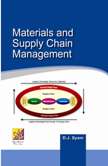
|
Materials and Supply Chain Management - D.J.Syam |
|
|
Cover Price : Rs 1,495.00
|
Imprint : Ane Books Pvt. Ltd.
ISBN : 9789382127819
YOP : 2014
|
Binding : Hardbound
Total Pages : 300
CD : No
|
|
About the Book
The primary objective of this book is to serve as a graduate textbook for the students of Business Administration and Engineering with particular emphasis on Materials Management, Business Logistics and Supply Chain Management.
This book can also serve as a useful guide for young professionals (Engineers, MBA's, CA etc.) who aspire to make a successful managerial career with corporate enterprises where materials resources play a vital role in achieving viable sustenance with credible results. Since the cost of materials constitutes a substantial portion in the cost of saleable products, there is an imperative need to manage material-resources efficiently, effectively and optimally. In the era of globalized competitive business environment, the deployment of trained and competent materials management personnel will be one of the priority considerations for the manufacturing as well as the retail sector business enterprises.
This book seeks to provide the fundamental knowledge inputs to the upcoming business managers and professionals.
Contents
PART I: MATERIALS MANAGEMENT
1. Materials Management: An Introduction
2. The Functions of Materials Management: Scope of Activities Involved
3. Scheduling of Material Requirements and Consumptions
Material Budgeting
Procurement
4. Quality Plan
Quality Control of Incoming and Outgoing Materials
5. Packing and Shipment (Inward and Outward)
Storing, Conservation, Distribution and DIsposal
6. Inventory Management and Control:A Critical Function in Materials Management
MRP-I and MRP-II
7. Science of Materials
Engineering Materials and their Usages
Nanomaterials
8. Material Condification
Materials Handling
9. Materials Management for Capital Investment Projects
10.Selected Topics
PART II: BUSINESS LOGISTICS
SUPPLY CHAIN MANAGEMENT
11.Business Logistics
12.Supply Chain Management (SCM)
Annexures
Index
About the Author
D.J. Syam (Dhurba Jyoti Syam) obtained his Bachelor Degree in Electrical-Electronics Engineering from the University of Engineering and Technology Dhaka in the year 1962. He has to his credit over 39 years of working experience in different capacities in Industrial and Business Houses including around 32 years in BHEL; he retired as an Additional General Manager in 1999.
During his tenure with BHEL, he handled various important assignments in the areas of Project Management, Project Feasibility Studies and Capital Budgeting, Corporate Strategic Planning, Collaboration Co-ordination for Technology Transfer and absorption, Organizational Systems and Methods, Procurement and Purchasing activities, Commercial Management, Administration of Educational Institutions and other such assignments.
He then worked as General Manager-Project Marketing with a Private Joint Venture Company in New Delhi for about two years (2000-2002).
His concurrent interest in Education and Training prompted him to become a Referee (Guide) for AMIE-B-Course students of Electrical Engineering of the Institution of Engineers-India since 1972-73 and continued till end of 1999.
He also served as a Vice President of the Hardwar Management Association (affiliated to AIMA) for 4 years i.e. 1993 to 1997. He also served as a member of the Executive Committee of the Roorkee Centre of the Institution Engineers-India for 4 years (1996-2000).
Shri D. J Syam also served as an Adjunct Professor and Consultant Guide in EMPI-Business School, Chattarpur, New Delhi, for some time in 2004-2005.
Currently, he is a Consultant on Industrial Projects as well as ISO-9001-QMS certification being an FICCI-Accredited Lead Auditor for ISO-9001-QMS. He also delivers lectures on Business Administration related topics to students of business schools(on invitation).
Shri D.J. Syam has authored three books on Management Education titled: 'Capital Investment Projects: Concept to Commissioning', 'Handbook of Corporate Operations Management' and 'Enterprise Resource Management'; these books have since been well received by professionals engaged in business administration, as well as by those in the management education and training.
The present book titled 'Materials and Supply Chain Management' is the fourth book written by Shri, D.J. Syam. |
|
 |
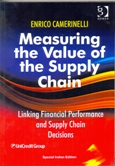
|
Measuring the Value of the Supply Chain - Enrico Camerinelli |
Author |
Enrico Camerinelli
|
|
Cover Price : Rs 3,995.00
|
Imprint : Gower / Gower Publishing
ISBN : 9788186268650
YOP : 2015
|
Binding : Hardbound
Total Pages : 236
CD : No
|
|
In a company ecosystem the supply chain manager is tasked with duties and objectives primarily aimed at controlling and reducing costs, while optimizing the material flows. Yet, in many organizations, common perception limits supply chain management to product logistics, materials handling and warehouse management. The supply chain manager must learn how to communicate the results of his work to show the importance and impact supply chain management operations have on a company.
In this book, Enrico Camerinelli provides the supply chain manager and the chief financial officer with the means to link the value of the supply chain to an organization's bottom line. He explores the problem with current supply chain metrics, shows how to close the gap between financial decisions and supply chain performance, suggests a model to provide a lingua franca for supply chain, financial and other managers throughout the company and points to ways in which new technology can help measure the value of the supply chain.
Using case studies and interviews with supply chain and financial experts, Measuring the Value of the Supply Chain will help financial and supply chain managers achieve strategic advantage through effective supply chain management.
Contents
Introduction; Part 1 Current Thinking on Supply Chain Measurement: Supply chain management today; Supply chain management as a strategic corporate asset; Managing flows of goods, information, and funds – the role of the CFO and Financial Services Providers. Part 2 Metrics and Models: How do companies measure the performance of their supply chains? The SCOR™ model; Mapping operations with finance; A new way to model the value of the supply chain; Closing the gap. Index.
Enrico Camerinelli is a Senior analyst within Celent's Banking group, based in Europe. His current research focuses on the Financial Supply Chain. Prior to joining Celent, he was an independent analyst and advisor to organizations such as the Supply Chain Council and the Theory of Constraints International Certification Organization. He has been vice-president and research leader of the worldwide practice of Enterprise Application Strategies at Meta Group, and a senior marketing consultant at J.D. Edwards.
He is also Consultant Editor at Finance Director Europe (www.the-financedirector.com) and a regular contributor to the magazine.
|
|
 |
|